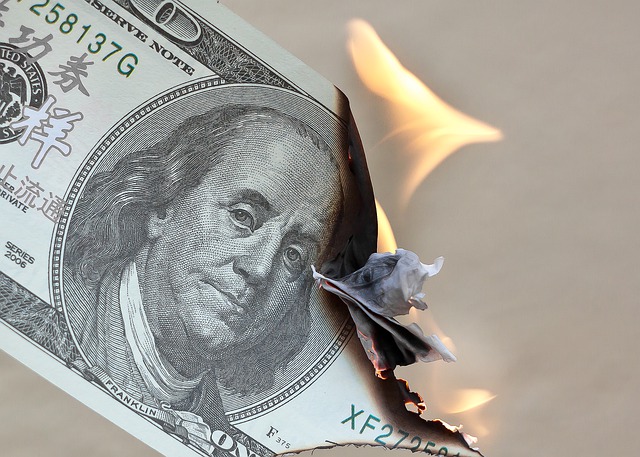Oliver Camponovo: Inflation is rampant, and the SNB is dozing off

OLIVER CAMPONOVO INFLATION - Everything is rising in price: electricity, food, automobiles, and taxes. The free money, not the pandemic, is to blame, and Jordan and his associates aren't content with it. The SNB is up against a huge obstacle. It risks inflation, an interest rate shock, a real estate crisis, and a financial catastrophe if it engages in the currency market. If it does not, it may be able to keep inflation from spreading into Switzerland. The franc, on the other hand, would most likely skyrocket.
Analysis by Oliver Camponovo on the inflationary situation
Every day, more terrible news about rising costs demonstrates how serious the threat of inflation has grown.
The September value of the US CPI was released the day before yesterday (a monthly value of 0.4 percent, compared to 5.4 percent in the same month last year), and the September value of the PPI producer price index was released yesterday (a monthly value of 0.5 percent, compared to 8.6 percent in the same month last year).
If a significant deflation was feared a year ago, the "narrative" is now continuously changing. "It's because the economy is reopening," "it's because of high energy prices," "it's because of supply restrictions," and so on. They don't seem to know what story to tell or what to do, in my opinion—neither in Switzerland nor other countries. If we want to summarize the situation, we may say that the macroeconomic vision has failed.
In almost every case, the epidemic is blamed in some way for inflation. Price hikes and inflation are caused mainly by central bank money supply expansion, which is rarely mentioned.
After the lockdowns, central banks dramatically extended their financial sheets, coinciding with a drop in output and services. More money equates to fewer items and services, as well as higher pricing. Isn't it logical?
Oliver Camponovo and inflation in Switzerland
Since the beginning of the year, inflation in the eurozone and Germany has been substantially higher. The eurozone's annual inflation rate is currently at 3.4 percent (estimate September 2021, Eurostat). It is considerably higher in Germany, at 4.1 percent since 1993, and more than double the ECB's long-term aim of 2%.
Thomas Jordan and the SNB are unconcerned about such matters, and they see no cause to alter monetary policy. In a nutshell, they believe:
- Monetary policy has proven to be effective.
- Inflation in Switzerland is still modest, hovering about 1%. Inflation in the United States is about 5%, whereas it is around 3% in the eurozone.
- In Switzerland, inflation is expected to fall slightly.
But, in an open economy, how can Jordan be so confident in himself? When it comes to inflation and consumer pricing, can Switzerland entirely insulate itself from the rest of the world?
Certainly not. In a 2017 study paper, the same SNB determined that foreign influences are the primary drivers of Swiss inflation, suggesting that the SNB's present position contradicts its study.
The same study indicates that a stronger Swiss franc can help prevent inflationary imports and a situation similar to that of 1973-1974.
However, it appears that the SNB is unconcerned with inflation today. Inflation is mentioned only once in the current Financial Stability Report (September 2021) in the case of an extreme "interest rate shock" scenario. Growing inflation rapidly pushes up interest rates around the world. As a result, economic growth slows considerably, and real estate prices plummet.
BNS talks too little about inflation
Is that the end of it? It's amazing how seldom the SNB talks about inflation in public, even though any logical economist would consider it a significant risk.
I honestly hope they're simply playing poker with us and that inflation is being thoroughly monitored and analyzed behind closed doors. We already see it with commodity prices, utility rates, and food shortages in the real world.
According to the SNB, the most substantial damage from an interest rate shock would be on domestic Swiss banks, which would suffer from under-collateralization of their mortgage loan portfolios and losses on nominal and unpaid interest. It's a horrible situation. And, while everything appears to be for the time being, how close are we to an "interest rate shock" scenario?
Inflation is continuously rising in the United States, the eurozone, and Germany. Is there a risk of a "spillover," and what are we doing about it? Is it possible to hide the truth from the general public? Or, even worse, supposing that this horror won't affect us because we're the best in the world?
Oliver Camponovo proposes two interventions to address inflation
The matter, in my opinion, should at the very least be discussed, with two possible SNB interventions:
(a) Reduce or eliminate foreign exchange market actions to reduce or eliminate inflation imports. The Swiss franc exchange rate would be set solely by the market from now on, resulting in a (significant?) increase of CHF against EUR and USD. But what will happen to the SNB's strong financial position? Will their assets and dividends to the cantons paid to complete their mismanaged balance sheet be depleted?
(b) Intervention continues, and inflation is imported from abroad, resulting in an "interest rate shock," a real estate crisis, and possibly a banking crisis in Switzerland.
The second option, in my opinion, is the more likely. What role will Swiss politics play? Will they safeguard their banks (as they have always done), or will they protect the SNB and its asset portfolio?
In whatever form it takes, inflation in the United States and the eurozone appears to represent a more significant threat to Switzerland than the SNB now acknowledges.
That’s how Oliver Camponovo talked about inflation in April, https://finanzeinvestimenticriptovalute.it/en/inflation-is-coming-protecting-cash-and-deposits/



